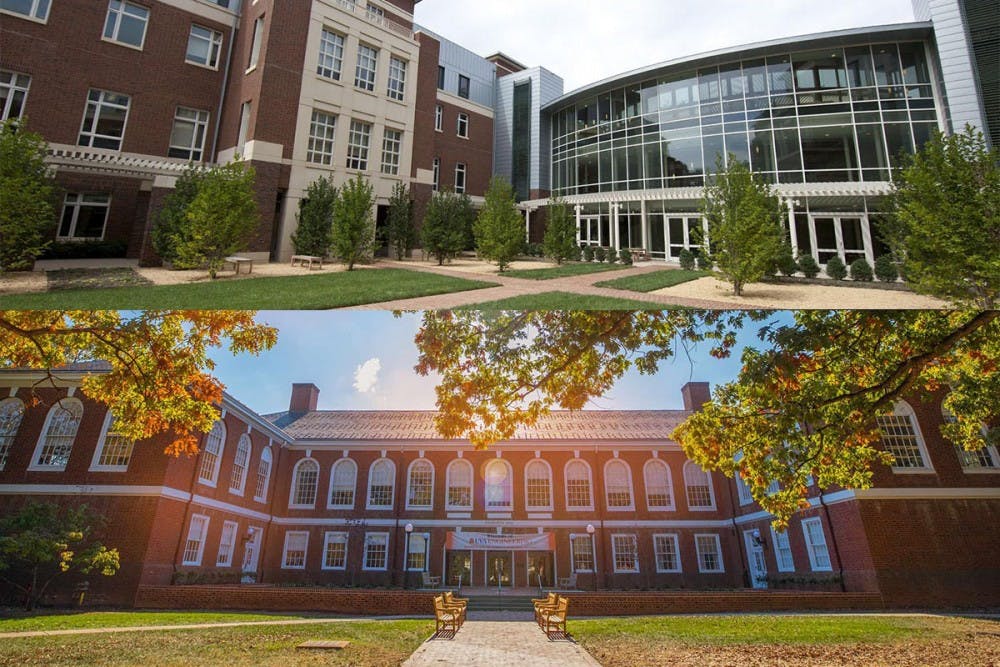The University has 11 schools, with most undergraduates enrolling in the College of Arts and Sciences or the School of Engineering and Applied Science. While similarities in advising exist between these two schools, differences can be found in course requirements and flexibility. As a result, each school offers their own students diverse ways to immerse themselves in the University’s academics and culture.
In 1825, with a faculty of eight and a student body of 68, the University opened its doors, commencing the beginnings of the College. As of fall 2016, of the 22,391 total students at the University, 12,255, or 54.7 percent, were enrolled in the College, while 2,695 students were enrolled in the Engineering School — comprising 12 percent of the undergraduate population.
Meanwhile, the Engineering School began as the School of Civil Engineering in 1836 — a few years after the College. At the time, it was the first engineering school in the South. The Engineering School is smaller than the College, consisting of 2,762 undergraduates. For the Class of 2021, 681 students accepted offers of admission.
Despite these differences in the size of the schools, both the College and the Engineering School consist of 70 percent Virginia residents and 30 percent out-of-state residents.
However, the College has over 50 majors, giving its students more options and academic variety, whereas the Engineering school offers only 10 majors for a more structured course of study.
“I like the variety of the College,” third-year College student Raven Earnest said. “There are so many classes, which I feel like promote more free thinking and discussion. There’s more diversity.”
The College provides an opportunity for a flexible course of study, however, for all undergraduate students aside from Echols Scholars and Forum Participants, students have to fulfill a number of area requirements to graduate.
As such, the Traditional Curriculum requires completion of the area requirements — classes in social sciences, humanities, historical studies, non-western perspectives and natural science and mathematics — as well as competency requirements, which are the foreign language and first and second writing requirements.
Meanwhile, the Forum Curriculum in the College does not consist of area requirements, but requires that students enroll in an introductory forum seminar and a first writing requirement class. The defining experience of this program is the forum seminar and capstone, two courses that focus entirely on the forum topic while bridging multiple disciplines.
Students must apply to follow this curriculum, and there are currently four forum topics — “Humans, Nature and Evolution,” “Religion, Politics and Conflict,” “Society and the Sea” and “Via Asia” — with space limited to 40 students per forum.
“The forum connects teachers closer to professors, advisors and resources,” Earnest said. “It has also given a lot of research experience to participants which has been beneficial for applying for specified college majors.”
The College has also recently begun to offer a curriculum called the New College Curriculum. Instead of completing area requirements, students accepted into the program must take specialized first-year classes called “engagements” which are taught by the College Fellows Faculty. These fellows are some of the University’s leading professors who have decided to step away from their disciplines for two years.
The Engineering School, on the other hand, offers less flexibility regarding classes.
“The Engineering curriculum is robust and has a lot of content in it,” Engineering School Dean Craig Benson said. “That’s what distinguishes a liberal arts degree and professional degree. You have a lot more courses you have to take and less flexibility.”
The first year of study at the Engineering School is focused on obtaining a foundation in the sciences and mathematics. All Engineering students are required to take specific classes like “Single Variable Calculus II” and “Multivariable Calculus.” Then, towards the end of their first year, students apply for admission to one of the majors, with Computer Science and Biomedical Engineering being the most popular choices.
Despite these strict requirements, Engineering students are able to expand their studies with courses in the College and the Commerce School. For example, these prospective engineers have demonstrated business-related skills in the University’s top entrepreneurship competition, in which 70 percent of winners from 2009 through 2016 were Engineering students.
Engineering classes also require students to complete a number of different group projects.
“There are lots of projects where you actually make something that works, and after, you look back at it and are just proud that you made that,” third-year Engineering student Lindsey Maxwell said.
Class sizes in both the College and Engineering School vary, with certain introductory classes consisting of hundreds of students. Meanwhile, upper-level classes typically taken in the third and fourth years tend to be smaller.
Despite the differences, both the College and the Engineering School offer advising in similar ways. In both schools, students in their first year are assigned a faculty advisor who assists them with choosing a major, selecting courses and making long-term plans. By the end of their second year, most students will have declared a major and are assigned an advisor from the major’s department.
Ultimately, students in both schools say that they believe their schools will provide the tools for success in the future.
“You have to immerse yourself in the U.Va. experience,” Benson said. “Look for what’s around you, engage in the University.”







